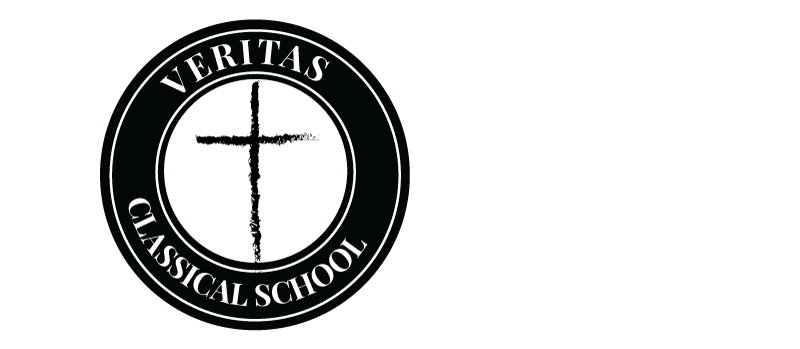Veritas Classical School
7/8 Humanities Day Syllabus
Bible: Discover 4 Yourself Inductive Bible Studies for Kids Series
- Students will learn the skills needed to study the Holy Bible: observation, interpretation, and application. Throughout the year, they will use the Inductive Bible Studies approach when interacting with God’s word.
History & Geography: Mystery of History Volume III by Linda Lacour Hobar
- Students will gain a Christian perspective of history during the Renaissance, Reformation, & World Exploration (1455-1707). Each week they will study three lessons and be expected to look deeper into topics through research, mapping, historical fiction novels, and special projects. They will learn notetaking skills and learn how to interact with primary source documents. Student-led Socratic Seminars will be employed to discuss “big picture” issues.
Literature: Cross-Curricular-All literature is connected to the Renaissance, Reformation, and World Exploration either by date of publication or thematically.
Quarter 1
The Story of King Arthur and His Knights by Howard Pyle
- Bridging the eras of the medieval Dark Ages and the beginning of the Renaissance or rebirth is an excellent way to begin our journey through time period literature! Pyle’s classic retelling of King Arthur and his knights is set in medieval times, but around the time of 1469, Sir Thomas Malory compiled Le Morte d’Arthur while he was in prison. In fact, Malory’s English compilation of the Arthurian legend occurred during The War of the Roses, which is where students begin their historical exploration. Inspiring many retellings of King Arthur-including Howard Pyle’s The Story of King Arthur and His Knights-as well as other great classic literature, Malory’s literary legacy remains today.
Quarter 2
Shakespeare Retold by E. Nesbit
A Mid-Summer Night’s Dream by William Shakespeare
- Most people think of Shakespeare when they think of the Renaissance, and rightly so! Shakespeare is one of the greats that wrote during the Renaissance. Students will read retellings of a few of Shakespeare’s greatest plays as a springboard to jump into one of his best known comedies.
Quarter 3
Don Quixote by Cervantes (We are reading the Dover Children’s Thrift Classics Adventures of Don Quixote)
- Published in two parts (1605 and 1615), this novel is one of the most widely read classics of Western literature. It is considered the prototype of the modern novel. Through his novel, Cervantes invites the reader to explore societal morals.
The Dangerous Journey: The Story of Pilgrim’s Progress retold by Oliver Hunkin
- Before diving into the original Christian classic, The Pilgrim’s Progress by John Bunyan, students will read Hunkin’s retelling in order to familiarize themselves with the story.
The Pilgrim’s Progress by John Bunyan
- This novel is a widely read Christian classic that explores the pilgrimage of a Christian from this world to Heaven by way of an allegory. Bunyan’s 1678 publication is still relevant today.
Quarter 4
The Hobbit by J.R.R. Tolkien
- J.R.R. Tolkien translated the 14th century Sir Gawain and the Green Knight, one of the best-known Arthurian stories. Themes from Sir Gawain and the Green Knight made their way into The Hobbit. The journey and quest toward heroism is a theme that spans this year’s literature.
Writing: Institute for Excellence in Writing Style & Structure Year 1, Level B
- Note Making and Outlines
- Writing From Notes
- Retelling Narrative Stories
- Summarizing a Reference
- Writing from Pictures
- Summarizing Multiple References
- Inventive Writing
- Formal Essay Models
- Formal Critique
Grammar: Rod & Staff
- Parts of Speech
- Parts of the Sentence
- Capitalization & Punctuation
Vocabulary: Words to Go
- New Vocabulary Words
- Context Clues
- Antonyms and Synonyms
- Analogies
- Root and Base Words
- Prefixes and Suffixes
Logic: Canon Logic Series Introductory Logic: The Fundamentals of Thinking Well
Students will practice thinking and arguing well through applying logic. Highlights of class include:
- Form and Interpret Statements
- Compose Valid Syllogisms, and Expose the Invalid Fakes Using Counterexamples
- Analyze Arguments in Normal English
- Identify and Detect Informal Fallacies
Colossians 2:2-3
2 My goal is that they may be encouraged in heart and united in love, so that they may have the full riches of complete understanding, in order that they may know the mystery of God, namely, Christ, 3 in whom are hidden all the treasures of wisdom and knowledge.

